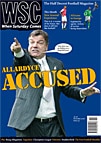 Dan Herd explains that although he saved them from administration, chairman Ken Davy is not flavour of the month among Town fans
Dan Herd explains that although he saved them from administration, chairman Ken Davy is not flavour of the month among Town fans
When around 100 Huddersfield Town fans gathered outside the Galpharm stadium to protest about chairman Ken Davy’s lack of investment in the team after the 3-2 home defeat by Yeovil on September 16, many outside observers were confused. After all, this is the man who, in July 2003, had taken the club out of administration, thus saving the Terriers from extinction. Since the takeover, Huddersfield Town have gone from League Two to the League One play-offs in three seasons – so what is there to protest about?
Davy is also chairman and owner of the Huddersfield Giants rugby league team. In March 2005 it was discovered that some 15 months earlier, Davy had transferred the 40 per cent share Town had in KSDL (the company managing the stadium) into another company, called Huddersfield Sporting Pride, which also contains the 20 per cent share the Giants owned. Then chief executive Andrew Watson claimed the reason for the transfer was to protect the football club from the £8 million liabilities the stadium company had. However, if the stadium is managed better than it had been previously, it will surely become a valuable asset to whoever owns it and, since December 2003, that does not include Town.
This, coupled with uncertainty surrounding how much money Town made last season from various windfall payments (an FA Cup tie at Worcester screened live on the BBC, an away tie at Chelsea in the third round, reaching the play-offs) and average home attendances of around 13,000, has led to supporter concern that not nearly enough is being put back into the team. Indeed, in December 2005, before all the windfalls happened, Davy claimed the club was self-sufficient and would have paid off the debt it owed to former players by this summer.
In response to the protests, Davy claimed in his programme notes that Huddersfield Town have a successful academy, the running of which costs hundreds of thousands of pounds a year. However, although the academy does cost a lot to run, the bulk of the financing comes from various grants and lotteries – the club made up a shortfall of around £38,000 last year. This is a small amount, considering that the academy has produced around 60 per cent of the current first-team squad, along with generating precious funds in January 2004 through the sale of Jonathan Stead to Blackburn and more from his subsequent move to Sunderland, thanks to a sell-on clause. The money raised for the academy is earmarked for that purpose alone; suggestions in the local media that the income could be used to fund the purchase of new players are wide of the mark.
The team have started the 2006-07 season poorly. A home defeat to Mansfield in the Carling Cup was followed by the defeat to Yeovil after which came the protests. But it is the away form that has concerned the fans most. In 2006 Huddersfield have only won four away games, one of those being the first leg in the play-off semi-final against Barnsley (the home leg and the tie were then lost).
The squad is getting smaller each year, but it would seem the loan market is open only one way, with central defender Martin McIntosh loaned out to Grimsby after the first match of the season and striker John McAliskey being sent to Wrexham. Davy claims that the club should not “speculate to accumulate”, which is odd considering how much he has bankrolled the Giants over the years. The rugby club seem to have no problem attracting top-class international players to play in front of average crowds struggling to reach 6,000.
In 1999, after finishing bottom of the Super League for the second season running, the club “merged” with Sheffield Eagles to form Huddersfield/Sheffield Giants. The new club finished bottom for another season and eventually dropped the Sheffield part of the name. A new Sheffield Eagles club are currently in National League Two – well away from the Super League and its machinations over relegation.
No Town fan wants the club to go through the turmoil of administration again and many are pleased a prudent approach to the finances is being taken. But, given part of the club’s mission statement is to be established as “a top-30 club” by the centenary year in 2008, many fans simply do not believe Davy is showing anything like enough enthusiasm for the football team he owns.
From WSC 237 November 2006. What was happening this month
Brilliant